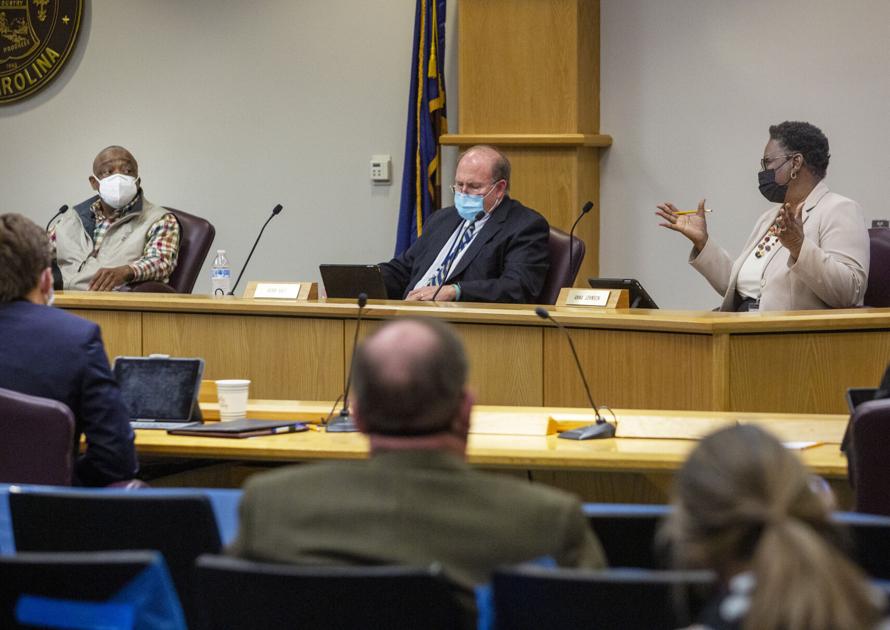When the Charleston County Council holds a public meeting, it is common for much of the meeting to be held privately, after council members declare a so-called “executive session” and leave the public view for the back room.
The Post and Courier reviewed all regular board and committee meetings available online, covering a six-month period from October to early March, and found that the board spent 17 hours behind closed doors during 16 meeting nights.
This represented 46.6% of the total meeting time. In six of the 16 meetings, more time was spent in private than in public.
“The public should be outraged,” said Bill Rogers, executive director of the SC Press Association. “Most public affairs need to be done in an open session.”

During 16 Charleston County Council meetings, from October to mid-March 2021, this message appeared for a total of 17 hours.
After a February 11 meeting in which the council spent two hours and 16 minutes behind closed doors – 76% of the time of the meeting – recently elected councilman Kylon Middleton said the county was doing a lot of business in the executive session.
“I am no longer voting to go to these executive sessions,” he said.
However, two of the three board meetings held since then included executive sessions, but then a rare thing happened on March 4: the board held a public meeting entirely in public.
“I will tell you, from my perspective, if the (county) attorney thinks we need to enter an executive session, I will follow that advice,” said council chairman Teddie Pryor, a councilor since 2004. “It’s not like we’re secret business in the back room. “

The concern with secret deals made behind the scenes is exactly what is generating a renewed interest in transparency. The council’s unusual confidence in executive sessions publicly appeared in February, when the Post and Courier reported that the county had paid $ 216,000 to former attorney Joe Dawson, who is now a federal judge.
The deal – the subject of a federal judicial ethics complaint – has not been discussed in public and has not been subject to a vote. At first, Pryor and former board chairman Elliott Summey, along with several other board members, denied knowing how the payment was approved or who drafted the contract, and different explanations were given for the payment.

It later emerged that all current board members, except Henry Darby, had attended an executive session in December at which the deal was discussed. And the contract was written by Dawson himself, the recipient of the money.
Darby said he would have objected, had he known that.
“I would never have agreed to that,” he said at a board meeting on February 16. “Never.”
Board members at the closed-door meeting later disagreed over what was discussed, and some denied knowing details such as the amount the county paid Dawson. Others backed down – Councilwoman Anna Johnson said that all board members except Darby were there when Dawson’s contract was discussed in detail – but the meeting was kept secret, so the public was left with conflicting reports.

Charleston County’s reliance on backstage meetings is unusual among local governments. In 2020, the city of Charleston held 63 City Council meetings, and there were executive sessions during eight of them.
These meetings are permitted by state law, in specific circumstances, but are not mandatory.

“You want to try to keep them as limited as possible,” said Charlie Barrineau, manager of field services for the South Carolina Municipal Association. “We tell them that the public is skeptical of executive sessions, to begin with, and while there is no rule about a time limit, we tell them that the longer and the more of these you have, the more skeptical the audience will become. “

Local governments can vote to enter an executive session to receive legal advice, but that does not mean that they have to go behind closed doors whenever they have a question for their attorney. Likewise, the law allows executive sessions to discuss appointments to a public body, but many local governments hold such discussions in public.
From October to early March, the Charleston County Council held 16 meetings that lasted 36.4 hours together. All but two of these meetings included executive sessions, and 10 of these sessions lasted more than an hour.

Barrineau said executive sessions may be needed to discuss incentives for economic development, legal strategy involving lawsuits or sensitive personal issues. The law requires an explanation of the purpose of an executive session.
“They are obliged to do more than say ‘executive session, personal matter’,” he said.

However, this is often exactly what happens.
In three consecutive County Council meetings in November, for example, “staffing” was the reason given for executive sessions. In one case, a “property sale” was also mentioned and in another “attorney-client privilege” was cited by Dawson, but none of the closed-door meetings was explained at the level of detail required by the Carolina Information Freedom Act. South.
There are few remedies, other than going to court to seek a restraining order, Rogers and Barrineau said. Rogers said the easiest way to prevent abuse of executive sessions is for public officials to resist them.

Catch up David Slade at 843-937-5552. Follow him on Twitter @DSladeNews.
